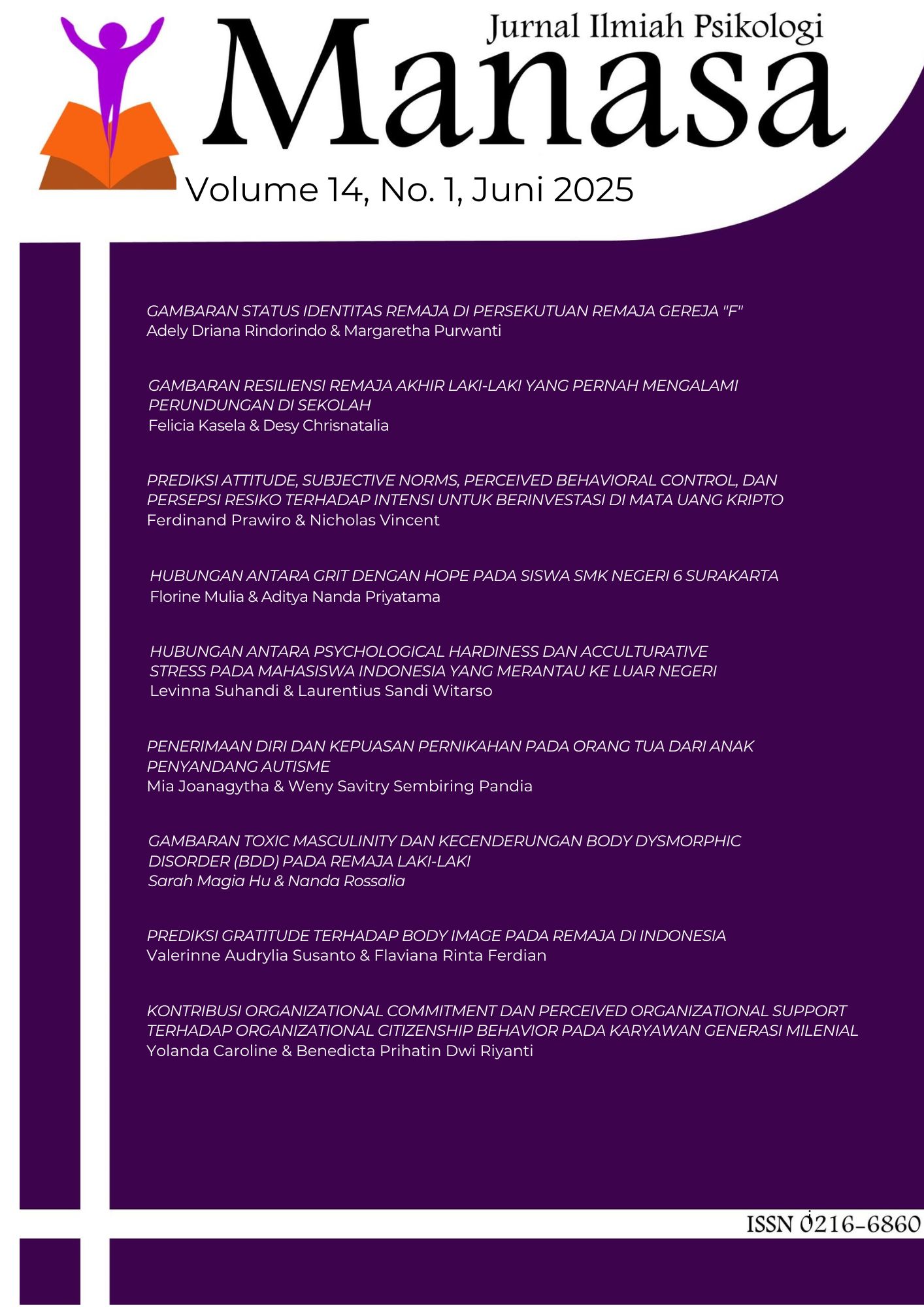Kontribusi Organizational Commitment dan Perceived Organizational Support terhadap Organizational Citizenship Behavior pada Karyawan Generasi Milenial
DOI:
https://doi.org/10.25170/manasa.v14i1.6646Keywords:
Affective commitment, millennial generation, Perceived Organizational Support, Society 5.0Abstract
Technological advancements in Society 5.0 have integrated humans with technology, encouraging millennials to prioritize their careers, maintain work-life balance, and pursue growth. A study involving 198 millennial employees (aged 24–43, each with at least two years of full-time work experience) investigated the impact of organizational commitment and perceived organizational support on organizational citizenship behavior (OCB). The results showed that while affective commitment and perceived organizational support significantly influenced OCB, continuance and normative commitments did not. These findings suggest practical implications for organizations seeking to enhance OCB among millennial employees. Specifically, developing targeted programs to strengthen affective commitment and enhance perceived organizational support – by making it more tangible and impactful for employees – can serve an effective strategy for fostering positive organizational behavior.
References
Aisyah, L. (2009). Hubungan antara iklim organisasi dengan organizational citizenship behavior (OCB) guru dan tenaga kependidikan di SDIT Al-Qalam Depok. (Skripsi tidak diterbitkan) Universitas Islam Negeri Syarif Hidayatullah. https://repository.uinjkt.ac.id/dspace/handle/123456789/2835
Allen, N.J. & Meyer, J.P. (1990). The measurement and antecedents of affective, continuance and normative to the organization. Journal of Occupational Psychology, 63, 1-18. https://psycnet.apa.org/doi/10.1111/j.2044-8325.1990.tb00506.x
Amran, A., et al., (2022). The role of perceived organizational support and organizational citizenship behavior in building employee performance. Journal of International Conference Proceedings (JICP), 5(3), 160–170. https://doi.org/10.32535/jicp.v5i3.1817
Ariarni, N., & Afrianty, T. W. (2017). Pengaruh perceived organizational support terhadap kinerja karyawan dengan employee engagement sebagai variabel intervening (Studi pada karyawan PT. Pos Indonesia Kota Madiun). Jurnal Administrasi Bisnis, 50(4), 169–177. https://www.neliti.com/id/publications/188279/pengaruh-perceived-organizational-support-terhadap-kinerja-karyawan-dengan-emplo#cite
Arif, M. (2021). Generasi milenial dalam internalisasi karakter nusantara. Kediri: IAIN Kediri Press.
Aswin, A. E., & Rahyuda, A. G. (2017). Pengaruh perceived organizational support terhadap organizational citizenship behavior dengan variabel kepuasan kerja sebagai mediasi. E-Jurnal Manajemen Unud, (6)5, 2729 – 2755. https://ojs.unud.ac.id/index.php/manajemen/article/view/29846
Azhar, Sari, E. Y., & Anam, C. (2019). Pengaruh persepsi dukungan organisasi dan kepuasan kerja terhadap organizational citizenship behavior (OCB) dengan komitmen organisasi sebagai variabel mediator. AKUNTABEL, 16(1), 36 - 46. http://journal.feb.unmul.ac.id/index.php/AKUNTABEL.
Budianto, C., Harjanti, D., & Suprapto, W. (2021). Komitmen organisasional pada karyawan generasi milenial: Peran nilai kerja dan kepuasan kerja. Majalah Ekonomi: Telaah Manajemen, Akuntansi dan Bisnis, 26 (2), 67-74. https://doi.org/10.36456/majeko.vol27.no2.a4739
Chen, Z. (2009). Perceived organizational support and extra-role performance: Which leads to which?. The Journal of Social Psychology. 149(1), 119-24. https://doi.org/10.3200/SOCP.149.1.119-124.
Creswell, J. W. (2014). Educational research: Planning, conducting and evaluating quantitative and qualitative research. Harlow: Pearson Education Limited.
Deloitte. (2023). Gen Z and millennial survey waves of change: Acknowledging progress, confronting setbacks. Toronto: Deloitte. https://www.deloitte.com/content/dam/Deloitte/global/Documents/deloitte-2023-genz-millennial-survey.pdf.
Devina, D., & Dwikardana, S. (2019). Indonesian millennials’ needs in the workplace: A case study in PT Akur Pratama. Jurnal Ilmiah Administrasi Bisnis, 15(2), 101-116. https:// doi.org/10.26593/jab.v15i2.3826.
Eisenberger, R., Armeli, S., Rexwinkel, B., Lynch, P. D., & Rhoades, L. (2001). Reciprocation of perceived organizational support. Journal of Applied Psychology, 86(1), 42–51. https://doi.org/10.1037/0021-9010.86.1.42
Field, A. P. (2009). Discovering statistics using SPSS (3rd ed.). SAGE.
Gallup. (2016). How millennials want to work and live: The six big changes leader have to make. Washington: Gallup Inc.
Glazer, S., Mahoney, A., C., & Randall, Y. (2019). Employee development’s role in organizational commitment: A preliminary investigation comparing generation X and millennial employees. Industrial and Commercial Training, 51(1). 1-12.
https://doi.org/10.1108/ICT-07-2018-0061
Gong, B., Greenwood, R. A., Hoyte, D., Ramkissoon, A., & He, X. (2017). Millennials and organizational citizenship behavior: The role of job crafting and career anchor on service. Management Research Review, 41(7), 774-788. https://www.emerald.com/insight/content/doi/10.1 E.108/mrr-05-2016-0121/full/html.
Grasiaswaty, N. (2021). Reviu sistematik penelitian organizational citizenship behavior (OCB) di Indonesia. Buletin Psikologi, vol. 29, no. 1, 28-44. https://doi. org/10.22146/buletinpsikologi.48004.
Elita, H., et al. (2021). Komitmen organisasi karyawan dan pengaruhnya terhadap organizational citizenship behavior. KELUWIH: Jurnal Sosial dan Humaniora, vol.2(2), 69–77. https://doi.org/10.24123/soshum.v2i2.4082
Forsslund, E., & Halin, J. (2018). Understanding millennials' workplace preferences. (Bachelor Thesis). Luleå University of Technology. https://ltu.diva-portal.org/smash/record.jsf?pid=diva2%3A1220526&dswid=6986.
Hardika, Aisyah, E. N., & Gunawan, I. (2018). Transformasi belajar generasi milenial. Malang: Universitas Negeri Malang.
Jang, J., & Juliana. (2020). Pengaruh persepsi dukungan organisasi dan kepuasan kerja terhadap komitmen kerja dan organizational citizenship behavior generasi milenial di industri pendidikan. Jurnal Ilmiah MEA (Manajemen, Ekonomi, dan Akuntansi), 4(1), 141-160. https://doi.org/10.31955/mea.v4i1.216
Jovitta, N. (2019). Pengaruh persepsi dukungan organisasi terhadap organizational citizensip behavior pada karyawan PT Bank XYZ. (Skripsi Sarjana). Universitas Negeri Jakarta. http://repository.unj.ac.id/3109/1/Skripsi_1125153804_Nadiva%20Jovitta.pdf.
Khaleh, L. A. B. C., & Naji, S. (2016). The relationship between organizational commitment components and organizational citizenship behavior in nursing staff. International Journal of Medical Research & Health Sciences, 5(5), 173–179. https://www.scirp.org/reference/referencespapers?referenceid=2778422
Khoiriyah, N., & Izzati, U. A. (2021). Hubungan antara komitmen organisasi dengan organizational citizenship behavior pada karyawan. Character: Jurnal Penelitian Psikologi, 8(4), 28 – 41. https://doi.org/10.26740/cjpp.v8i4.41138
Kumar, R. (2014). Research methodology: A step by step guide for beginners. New Delhi: SAGE Publications.
Kurniawan, A. (2015). Pengaruh komitmen organisasi terhadap organizational citizenship (OCB) PT Bandung. Jurnal Manajemen, vol.15, no.1. https://doi.org/10.28932/jmm.v15i1.28
Luthans, F. (2011). Organizational behavior. New York: McGraw-Hill.
Meyer, J. P., & Allen, N. J. (1991). A three-component conceptualization of organizational commitment. Human Resource Management Review, 1(1), 61–89. http://dx.doi.org/10.1016/1053-4822(91)90011-Z
Organ, D. W. (1988). Organizational citizenship behavior: The good soldier syndrome. Lexington, M.A: Lexington Books.
Pradipto, Y. D., & Nabila. (2021). The effect of work satisfaction on turnover intention in millennials generation in Indonesia unicorn company with work engagement as moderating variable. International Conference on Biospheric Harmony Advanced Research, 729. https://doi:10.1088/17551315/729/1/012091.
Priandana, F. D. (2016). Pengaruh budaya organisasi dan perceived organizational support terhadap komitmen organisasi. (Skripsi Sarjana) Universitas Islam Negeri Syarif Hidayatullah). https://repository.uinjkt.ac.id/dspace/bitstream/123456789/39276/2/FAJRI%20DEA%20PRIANDANA-FPSI.pdf.
Rhoades, L., & Eisenberger, R. (2002). Perceived organizational support: A review of the literature. Journal of Applied Psychology, 87(4), 698–714. https://doi.org/10.1037/0021-9010.87.4.698
Robinson, S.L. & Morrison, E.W. (1995). Psychological contracts and OCB: The effect of unfulfilled obligations on civic virtue behavior. Journal of Organizational Behavior, 16(3), 289-298. https://doi.org/10.1002/job.4030160309
Sena, Tety Fadhila. (2011). Variabel antiseden organizational citizenship behaviour (OCB). Jurnal Dinamika Manajemen, 2(1), 70-77. http://journal.unnes.ac.id/nju/index.php/jdm
Suherman, Musnaini, Wijoyo, H., & Indrawan, I. (2020). Industry 4.0 vs society 5.0. Purwokerto: CV. Pena Persada.
Veličkovska, I. (2017). Organizational citizenship behavior-Definition, determinants and effects. Engineering Management, 3(1), 40-51. https://www.scirp.org/reference/referencespapers?referenceid=2778385
Wardani, B. K., Qurniawati, R. S., & Putra, Y. S. (2019). Upaya peningkatan komitmen organisasional generasi Z melalui psychological capital dan organizational citizenship behavior (Studi Kasus Pada Karyawan Generasi Z di Kota Salatiga). Proceeding Seminar Nasional dan Call for Papers 2019, 8(1). https://www.unisbank.ac.id/ojs/index.php/madic/article/view/7524
Downloads
Published
Issue
Section
License
Copyright (c) 2025 MANASA

This work is licensed under a Creative Commons Attribution-NonCommercial-ShareAlike 4.0 International License.









.png)
.png)

